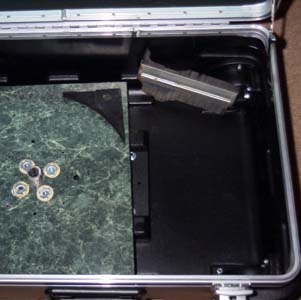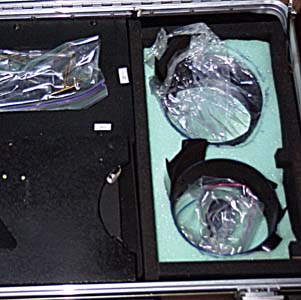| Everything goes inside the
suitcase along with
some packing foam.
You'll need to use some ingenuity getting everything to fit. Be sure to watch how loads get carried once everything is loaded in. Breaking the mirror due to handling loads is generally a bad idea. |
|
| I wanted to build an internal frame around
the optics to help support them. To do that I had to cut out the
sides so the frame would fit over the wheel wells of the case.
This little device allowed me to transfer the shape of the wheel well to the board for cutting. You can also see how the azimuth base runners straddle the handle well. |
|
| Now the telescope frame is in place. Note the two strips nailed and glued to the inside wall on the right of the frame. These help carry vertical loads transmitted through the elevation box and keeps them away from the optics. |
|
| Now the base and settings circles
are in
place. These are pretty heavy and can slide back and forth with
vertical
loads on the suitcase.
Any vertical loads are carried by the box and not the optics. |
|
| The portable table is now
loaded. It
just sits on top of the azimuth bas and setting circles.
This fills up the left side (also the top) of the suitcase. |
|
| Now the telescope optics are in
place protected
by foam, plastic bags and the inside box.
I've also placed the sides of the elevation box on top of the table and a bag of screws.
|
|
| This completes the packing. The elevation box sets on top of the telescope frame. It is held in place by the packing foam. The C-clamp, eyepiece, screwdriver and telescope bar all fit on top of this piece of foam. A similar piece is in the lid. When the lid closes everything is held securely in place. |
|
| Yes it does close. Nothing
rattles, and so
far nothing's broken. I still have not trusted it to United
Airlines, but
I'm pretty confident that I could.
I normally allow about 1/2 hour to unpack and assemble. Two-star alignment is another 1/2 hour. It can be 15 min. The real time savor is to make sure you can find your alignment stars and that they will be visible from your observing location. Total weight is 36 lbs. |
|
 |
|
|
|






